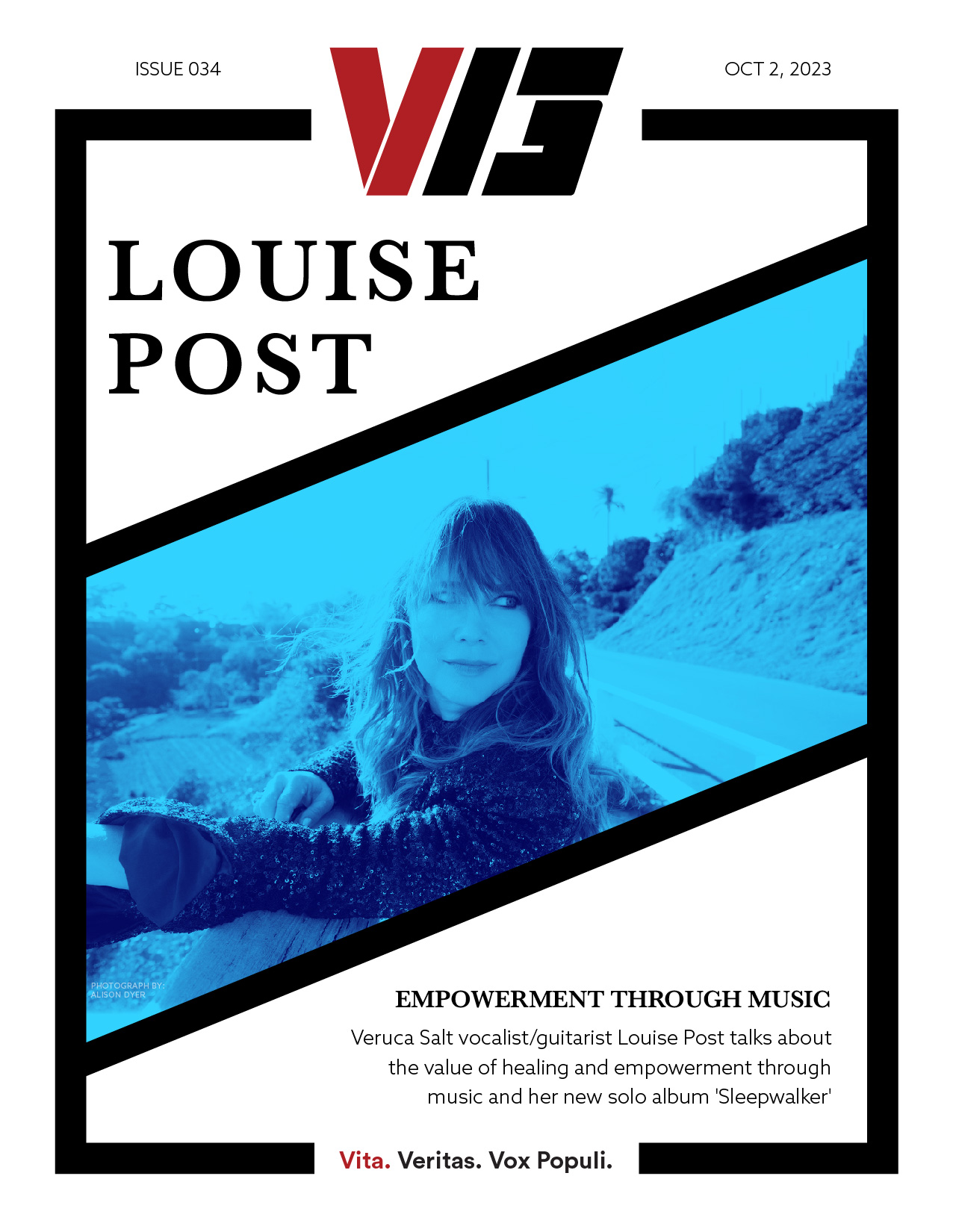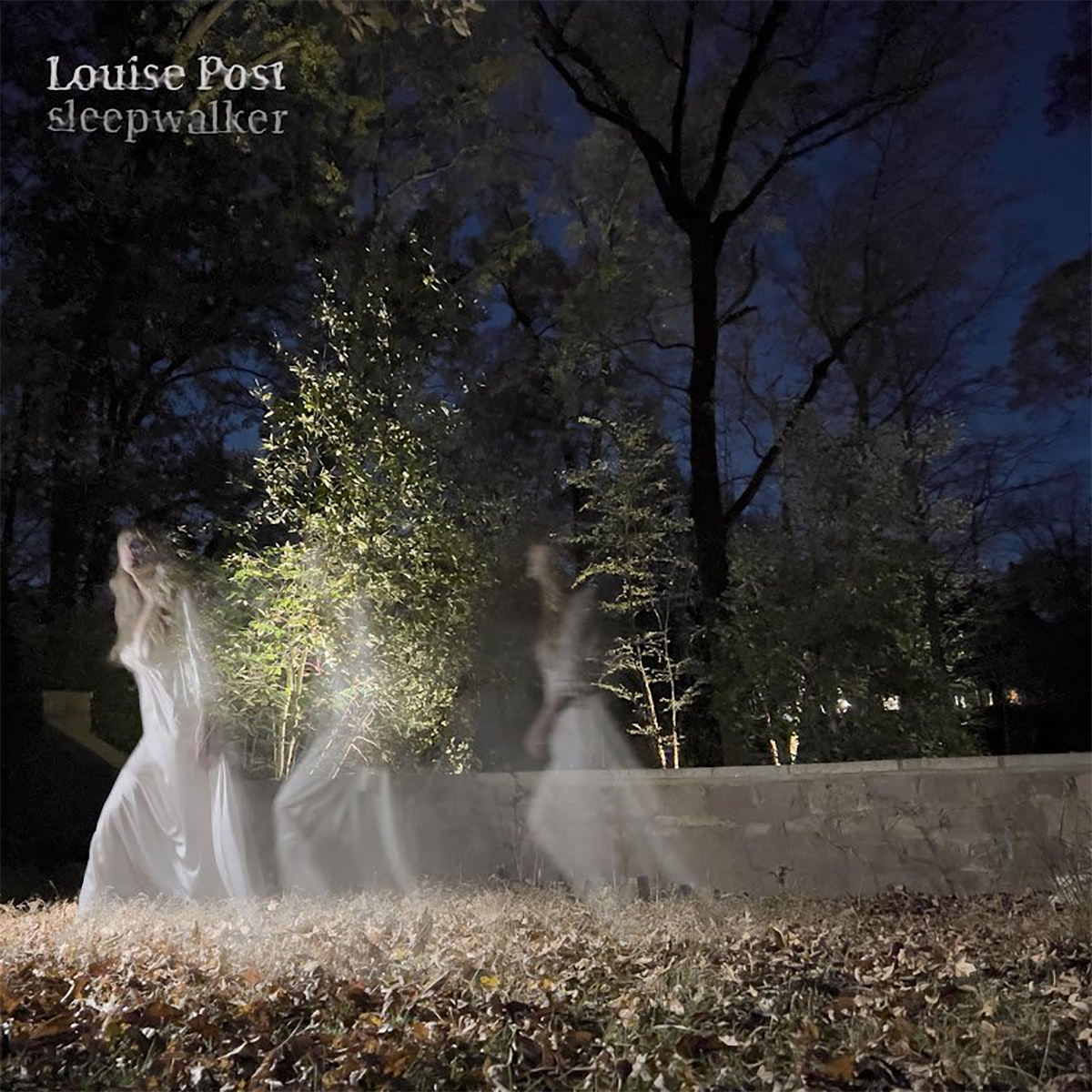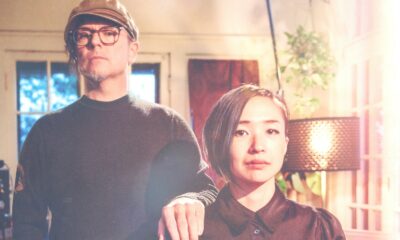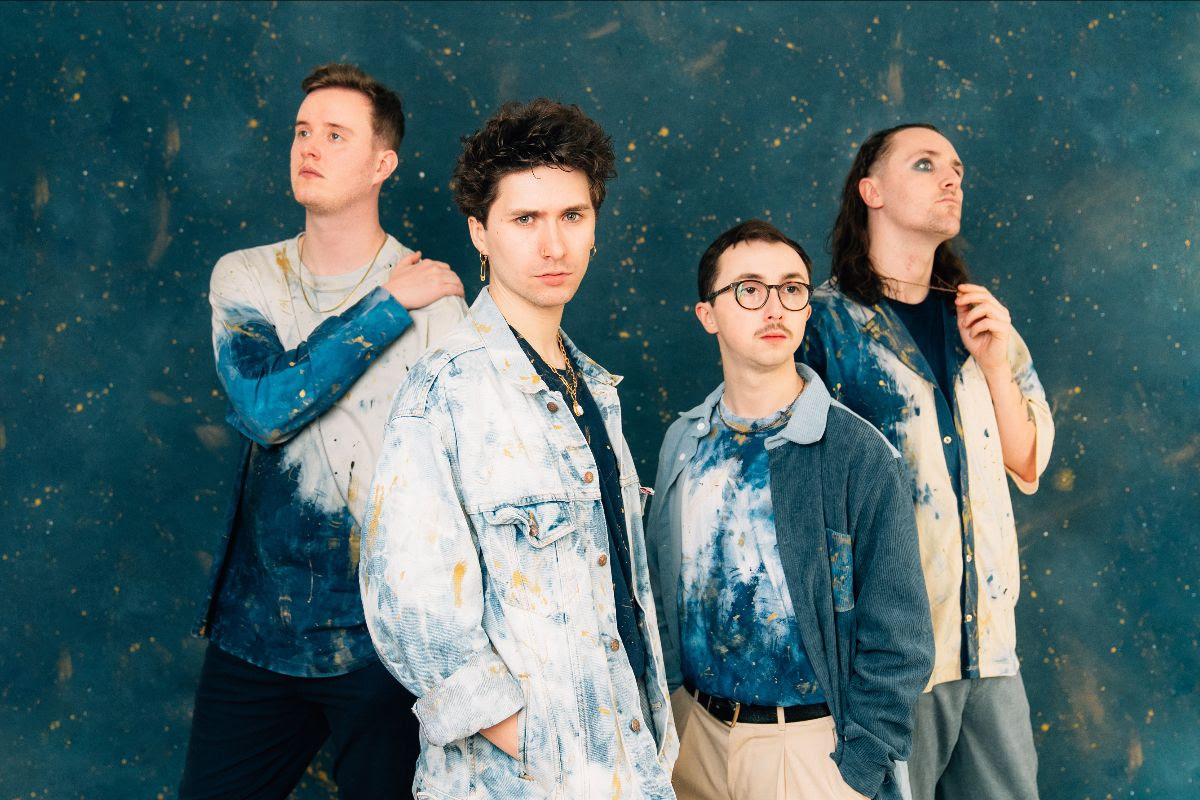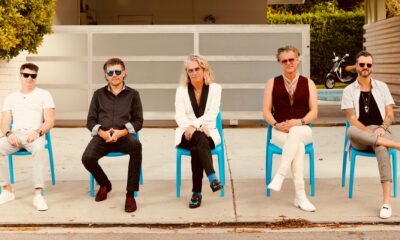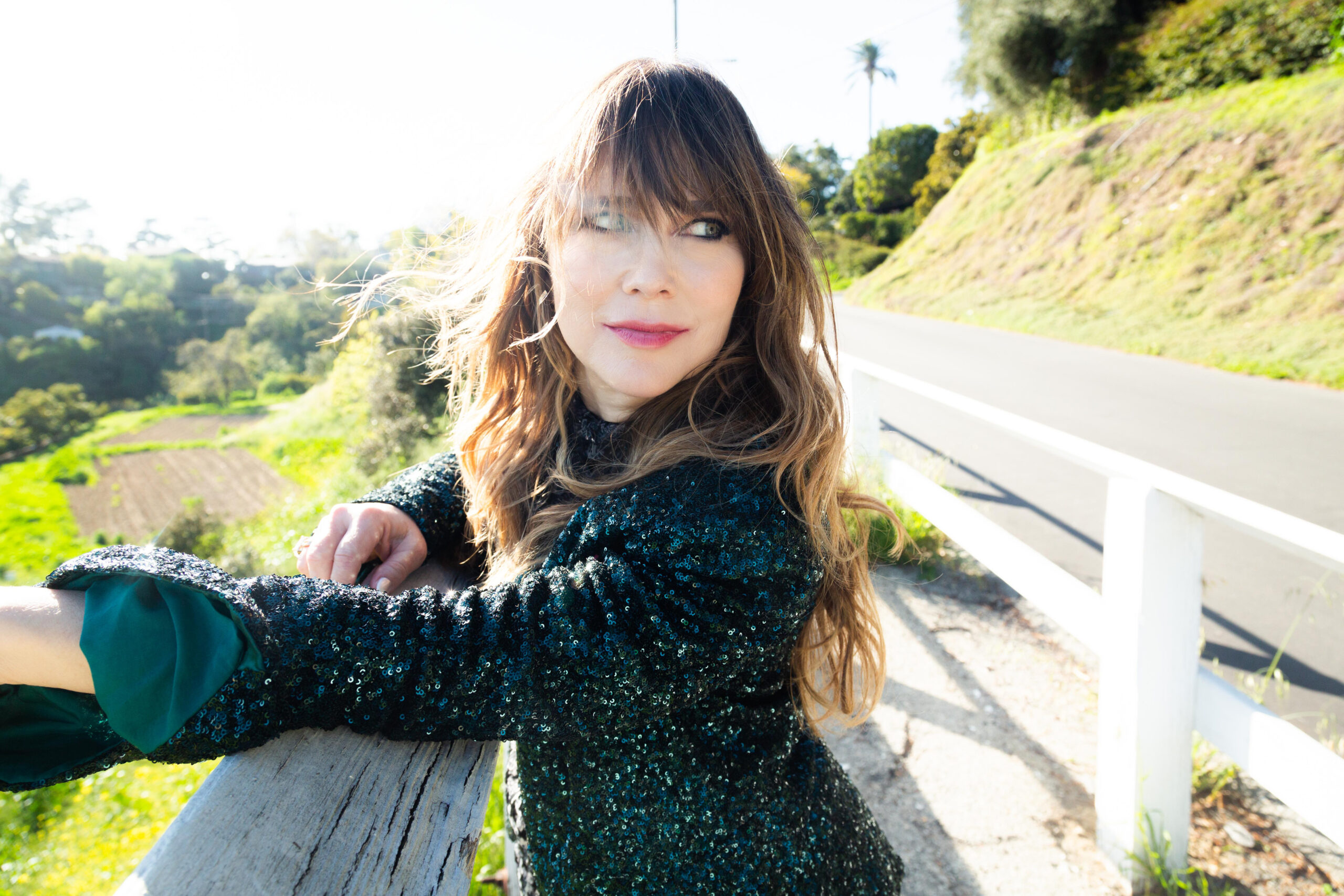

Alternative/Rock
Louise Post: “It’s the greatest feeling ever to know that people are caring about what you’ve just spilled your blood and guts into..”
Following the release of her solo album, ‘Sleepwalker’, Louise Post spoke to us about the importance of music in her life…
Known to her fans as vocalist/guitarist in alternative rock band, Veruca Salt, singer-songwriter Louise Post recently released her new solo album, Sleepwalker.
An album written before and during the pandemic, it finds the vocalist delving into personal themes around her childhood, regret and relationships as well as broader topics. Born from ideas some of which came to her in her sleep and some of which started out as rough ideas recorded as voice memo’s on her phone, as with all her music, Louise wants listeners to feel not only empowered and connected to her work, but ultimately, to come away from listening to the songs feeling happy.
In our latest Cover Story, V13 spoke to Louise Post about the solo album, and the importance of music in her life.
In terms of the record, you started writing it during lockdown, or before, if I’m correct? If life had remained normal, if that’s the right phrase, was the plan for a solo record?
“Well, I can’t really speculate about that because it was never a plan to begin with. It just sort of evolved. I think that even normal life is, you know, rife with tribulations and trials. I’m a songwriter, and I can’t seem to stop writing songs, even when I try. I imagine something would have given way and there would be an album. It would have been different had there not been a pandemic, I just can’t say how so necessarily.”
Well, that was going to be my next question. A lot of artists who we have spoken to over the last couple of years have said that, just having that break, and just being able to look at their music definitely, almost changed the direction of things. Is that the case for you? Do you think you would have gone down a different path?
“Yeah, I was definitely writing personal songs that weren’t meant for Veruca Salt necessarily. When I started writing for this record cycle, I didn’t know yet that again, it would be a record but, definitely, when I started writing, I realised pretty quickly that the way I work is to write and release. I like to see songs to fruition and then get them out there and share with my fans and keep the ball rolling so to speak. I don’t want the well to dry up. Not the creative well for me because that seems never-ending but for the fans. I want to keep them engaged, to keep offering them more music because it’s part of the relationship we have sort of a two way street.”
You mentioned this material wasn’t suitable for Veruca Salt or you didn’t think it would be used for that. Is there other material aside from the album material in your vaults that fans have yet to hear?
“There’s something to be said for any of my songs could be a Veruca Salt song because that’s sort of where I began. It’s not where I began, really, my roots are in just writing for myself. But I remember James Iha, at some point in the 90s, we were talking about going into the studio and he was talking about going in the studio with the Pumpkins and he was saying, “we take a song and then we give it the Pumpkins treatment and then it becomes what you know. It sounds like us…” and that’s how I feel about Veruca Salt to some degree. It’s like, I sing it, I sing it with Nina (Gordon, Veruca Salt Bassist), everybody gives it their personal colour and then it’s a Veruca Salt song. Any one of these songs could have been a Veruca Salt song but I was writing not necessarily with the band in mind.”
Did that change the way you wrote at all not having the band to bounce ideas off or give it that Veruca Salt twist? Did it change the way you approach writing?
“I was the final say for the songs. There was no like playing my songs for other people to see whether or not it was something that we can all get behind. It was like I was the jury and the judge. If it got past my litmus test, if it made the grade, then it was on the record. It was just about my excitement. It was helpful and my producer definitely played into that. His enthusiasm about songs would play into whether or not I wanted to go forward with them. If I had to push them through then he wasn’t necessarily as excited as I am, I had to show him my vision.
I love collaboration. I love having the input of others and playing off their creativity. So that was welcome. I love his input and his creative contribution. But it was fun to just be able to just say “this my record, I do what I want.” Just to be the boss and be the one who has the final say on everything.”
“I do like writing songs about the past because it allows me… it’s my own way of processing it and moving through things that are unresolved.”
Going back to what you said about sharing your vision. What was your vision for this record?
“Well, it depended on the song really. When I hear a song, I can picture all of the instrumentation and how I want it to go. For example, the last song of the record, “The Way We Live,” I could hear the energy. I could hear the layers of the harmonies stacked at the end. I could hear the outro being climactic and bombastic and epic and beautiful. Whereas when you just play a demo for someone, or like a rough idea of a song, you can’t necessarily convey that. So there’s a level of just let me get in there. Let me do my thing, trust me, it’s going to be incredible.
In terms of an album, this one or otherwise, I always imagine a record having hills and valleys, peaks and valleys and it taking you on a journey. I knew that I wanted to call it Sleepwalker as soon as I had a collection of songs that were album-worthy. I knew I was calling it Sleepwalker from early on because that’s what I did as a kid. It was very much me, very unique to me. Not that there are no other sleepwalkers but more because I identify so much with it and also because I was in a somewhat of a haze during the pandemic.
The songs really brought me back to life. They literally woke me up out of my sleep sometimes where I’d be dreaming a song and I’d wake up and think “I wish I wrote that.” Then I think “wait, I did write that. Let me sing it into my voice memos real quick.” Just to make sure I get it, get the idea down. Then, the next morning, I listened to it or forget to and see if it was actually as good, if I got the idea across because sometimes it’s incredible and in my dream it’s full on, it’s finished, it’s orchestrated and it sounds like it’s a giant song that you hear in a club. All I can get down is what I think the bassline is, maybe the drums, the energy of it, I try to remember the context and the melody. Sometimes that will turn into something vastly different, or sometimes I’ll be able to capture something of it that I felt in that dream.”
I read somewhere that you’d written three albums worth of material for this record. It sounds like you generally get a lot of ideas down then work from there. How did you whittle it down and pass the litmus test?
“Are you a musician?”
No, I’m not but just thought of it being like writing an article where you’ve got 3000 word limit and you reach 10,000 words thinking I can’t cut this down…
“Yeah, very much. Let’s see. Looking at my voice memos. I wrote a song in my sleep called “Indoor Sheen” on Thursday. Then I wrote a song in my sleep on Wednesday morning called “Beauty in the Birth.” That’s about my brother-in-law who recently recently passed tragically. I wrote a song on July 4th called “Looking at the Lake.” One on June 26th called “Scratching My Back”. Then I had something called “Rude Carwash Bassline. There’s a song called “Ohio” that I wrote on May 21st. I don’t know what these are. I mean, I don’t have enough time to go through them all. It’s constant and I don’t want it to stop but I want to have time to go back in the studio. I can just spend all my time in the studio just recording.
Luckily, there’s a time for that, there’s a time to put it down and like actually rest that muscle and go perform the songs and do fun things like interviews and, you know, travel and stuff and then back to that again. So I recorded three albums worth of material in there, they’re not all finished, seen to, as I said, seen to fruition but they are really good ideas that I’m dying to go back to.
Something I enjoy doing is going back to something six months later and revisiting it and seeing where it goes. I just go back through my voice memos, and I’ll start listening to something and I’m like, “wow, I forgot about that.” Then the song will just sort of write itself in my head over the course of the day. That happens a lot. It just keeps writing itself. I don’t know if you feel that way as a writer, but that’s my process. It just keeps going. Sometimes I have my daughter looking at me and talking to me. I feel really bad because I’m not able to listen to what she’s saying because I’m writing a song in my head. It’s a blessing. It’s a blessing and a curse. It’s basically it’s a marvellous and mysterious gift, I think.”
Yeah, definitely. Listening to the the single, it seems like some of the material comes from a personal place, from personal experiences. Is that the case?
“I think most of it does. I tend to write from a personal place. I also write from just experience. Like “Queen of the Pirates” is about an actual Queen of the Pirates who lived and ran the China South Seas. I forget her name but she’ll come right up in Google. There are a lot of famous but five notorious female pirates in history. Shang Chi Sao, one of history’s most influential writers, began her career in a Chinese brothel.
Chang Issa, or the wife of Chang, because she wasn’t allowed to use her real name was a Cantonese former prostitute who married a powerful, powerful Corsair named Chang Ching Chiang. The husband and wife team soon raised one of China’s most formidable formidable pirate armies. Their outfit boasted hundreds of ships and some 50,000 men, and it preyed on the fishing vessel supply junks and the coastal villages of Southern China with impunity. Upon her husband’s death in 1807, Mrs. Chiang elbowed her way into power and partnered with a trusted lieutenant and lover named Chang Pow. Over the next few years, she plundered her way across Southeast Asia, and assembled a fleet that rivalled many countries Navies. She had also penned a rigorous code of contact conduct for her pirates, rape of the female prisoners was punishable by beheading and disorders had ears lopped off.
She’s badass and so I wrote a song about her but it was also about my niece, who’s a total fighter and has a rare disease called Muscular Dystrophy Collagen Six. She’s like, you say no to her And she says, “Yes, I can do it.” So really this one began about her and about this, this pirate and then of course, I ended up inhabiting the character but it was based on that. The song secrets, for example, is it’s about an overdose that a friend of mine had, it’s not about me. So, there’s some stuff that is written from the first person perspective, but it isn’t necessarily about yours truly.”
Is the recent single about your own life and regret?
“Well, “What About” is about losing a loved one and facing the next half of my life and going “what the hell am I supposed to do without you? You weren’t supposed to be gone yet.” Where I’m feeling so groundless and really trying to make sense of the world without someone you planned to share the rest of your life with on whatever level. It applies to relationships, dying, it applies to death itself. It applies to losing someone that is a part of your fabric of who you are and imagining the rest of it with them but then being cut short. So yeah, certainly I’ve experienced that and certainly that was written in a place of like, “what the fuck am I supposed to do?”, you know?”
Are you the kind of person that when something doesn’t work out you can walk away? Or did you hold on to the past?
“I like the idea that the goal for me is to not regret the past nor wish to shut the door on it. To be able to accept it and appreciate it and honour it without focusing too heavily on it. But, I do like writing songs about the past because it allows me… it’s my own way of processing it and moving through things that are unresolved. I don’t want to waste any time really thinking too much, or focusing too much on what’s already happened but, if I need to process something, to understand it better so that I can be healthier, happier and more whole then that’s necessary ideally move on from it and be lighter for it.”
Another song, “We Believe”, this references back to childhood. What prompted you to dig into those early years?
“Well, I always have dug into the early years talking about focusing on the past. A way that I’ve always started writing has always been that I process my childhood. There’s a song on American Dies called “Celebrate You” which is very much about processing childhood. I say “tonight my nightgown is in knots. I toss and turn in your honour” and talk about my relationship with my Dad and what Christmas was like with my family. Also on Ghost Notes, Veruca Salt’s 2015 album, there’s a song called “The Sound of Leaving” which deals with some of the same themes. There’s never been a time when I don’t process the past in order to let it out and let it go. Maybe that’s a lifetime commitment, a lifetime endeavour? I don’t know, I don’t know? When things pop up, they need to be written about, I can’t do much about that. I think, hopefully, I’m always waiting to be able to go, “Okay, we’re done now. Move on.”
Do you find it cathartic to write about that, though? Not so much closing doors, but processing things that you haven’t processed earlier?
“Absolutely. I think song-writing for me is incredibly healing, and cathartic. I’d much rather write a song about it, then keep it all bottled up inside or go to therapy, or whatever it is. I’d rather write a song and have something to show for my experiences, or read a poem, and share that with the world and anyone who cares to listen and who it might help or who might identify with it because we’re all having the same human experience. I think as artists, poets and writers, it’s our job to keep the compassion alive and help people feel less alone with our output.”
You spoke about records being journeys, and having peaks and troughs and highs and lows. We’ve talked about the personal stuff on Sleepwalker, when someone listens to the record, what do you want them to take away from it? Or how do you want them to feel?
“Ideally empowered. First and foremost though, I want it to be a good listen. It’s hard for me to say what anyone’s outcome from listening to record should be but my the most my favourite records are ones that I can hold dear and that I really identify with or that make me really happy, that I can call my own. I guess my highest hope I could have is that people will connect with the songs lyrically and otherwise and that they can feel like it’s theirs.”
“I like the idea that the goal for me is to not regret the past nor wish to shut the door on it. To be able to accept it and appreciate it and honour it without focusing too heavily on it.”
What records do that for you?
“I think of Kate Bush‘s Hounds of Love and Sinead o’Connor‘s’ I Do Not Want What I Haven’t Got. The Lion and the Cobra is not my favourite one. It was the second one. There is Abbey Road, and Led Zeppelin Three and I think of U2‘s Under the Blood Red Sky. Even Post Malone. The Velvet Underground album. My favourite albums, they’ll hit me at a certain time and I feel like the songs are my own feel. I feel very precious about Jane’s Addiction’s Nothing’s Shocking. Nirvana’s Bleach, The Pixies Doolittle, The Breeders Pod. I could go on and on but my favourite records are ones that hit me at the right time and the songs are really special to me.
Music is so subjective and personal, and there’s no way to quantify it or calculate like how or why it is. It hits people at certain times the way it was. For me, those are my some of my favourite records, just off the top of my head. My biggest hope would be that people connect with Sleepwalker in a way that’s personal and meaningful to them and it uplifts them in that way just by having that connection and making them happy because that’s what music does, right?”
Absolutely. You’ve been out already on tour for about four months. What’s it like seeing those songs, which are personal to you, seeing people singing them back or talking to you about them at a show?
“It’s exhilarating and it’s really affirming and encouraging because it shows me that these particular individuals have already personalised it and it’s already theirs and they’ve been listening to it on their own so they know the lyrics. It’s funny that it used to be that I could tell by how much people are singing a song back if a song has really connected, whether it’s a single or not. Now I can tell when people raise their phones to videotape. You just know… It’s like all the phones went up during “The Way We Live”. For some reason everyone loves “The Way We Live”. A lot of songs on the record the phones go up but I don’t see a lot of live videos of that song on the internet. I do know that the phones go up on that song and I know people are signing along.
There are so many passionate fans singing along to this album album. It’s the greatest feeling ever to know that people are listening and caring to what you’ve just spilled your blood and guts, life’s blood into. It’s just profoundly satisfying and rewarding to see that and really touching because I’ve been a fan, I am that fan. I feel that way with other people’s music so I know what that means.”
What is your message to those fans?
“The fans keep me going, they keep me writing because I know that they care and I know that they’re listening and they’re watching and they’re waiting for the next thing I put out or the next thing I release. It’s the only reference point I have. I have incredible fans, really dedicated, devoted, loyal fans, who will follow me to the ends of the earth to come and see me play and are incredibly thoughtful, and respectful and caring, and really good people. I seem to attract a really quality level of human being and I feel so lucky.
I feel so lucky to be able to meet some of them before the shows or sometimes after and be able to hear how they care enough to tell me how my music has hit them whether it’s Veruca Sault records, or this current one or both. There’s so much love there. Even though touring can be stressful, it’s so worth it because meeting the fans and experiencing that connection is vital to my growth as an artist. I think especially after the lockdown and all the concerts coming to a screeching halt, I appreciate that so much more. The ability, the gift of playing live and being able to go see live music. My fans are incredible. What can I say other than that I love them?”
For all of Louise’s latest news and to pick up a copy of her brilliant new album, Sleepwalker, head over to Louise’s Official Website.
-

 Music6 days ago
Music6 days agoTake That (w/ Olly Murs) Kick Off Four-Night Leeds Stint with Hit-Laden Spectacular [Photos]
-

 Alternative/Rock14 hours ago
Alternative/Rock14 hours agoThe V13 Fix #011 w/ Microwave, Full Of Hell, Cold Years and more
-

 Alternative/Rock1 week ago
Alternative/Rock1 week agoThe V13 Fix #010 w/ High on Fire, NOFX, My Dying Bride and more
-

 Features6 days ago
Features6 days agoTour Diary: Gen & The Degenerates Party Their Way Across America
-

 Culture1 week ago
Culture1 week agoDan Carter & George Miller Chat Foodinati Live, Heavy Metal Charities and Pre-Gig Meals
-

 Music1 week ago
Music1 week agoReclusive Producer Stumbleine Premieres Beat-Driven New Single “Cinderhaze”
-

 Indie14 hours ago
Indie14 hours agoDeadset Premiere Music Video for Addiction-Inspired “Heavy Eyes” Single
-

 Alternative/Rock1 week ago
Alternative/Rock1 week agoThree Lefts and a Right Premiere Their Guitar-Driven Single “Lovulator”

